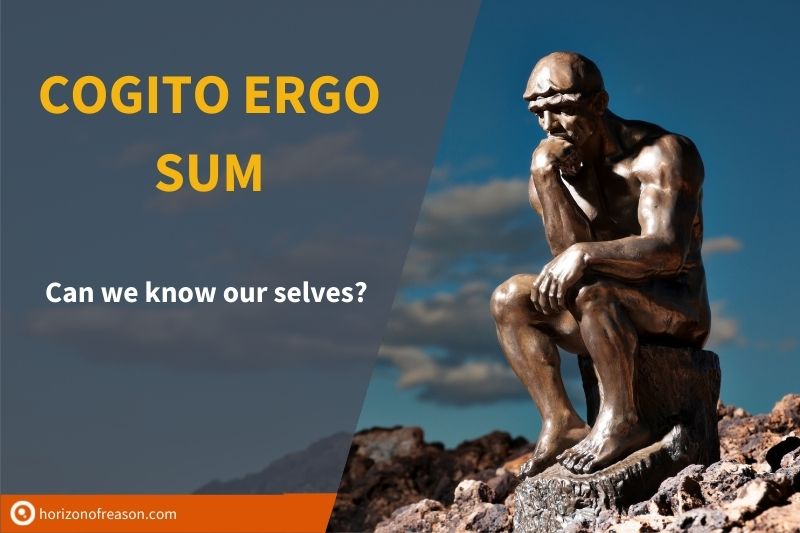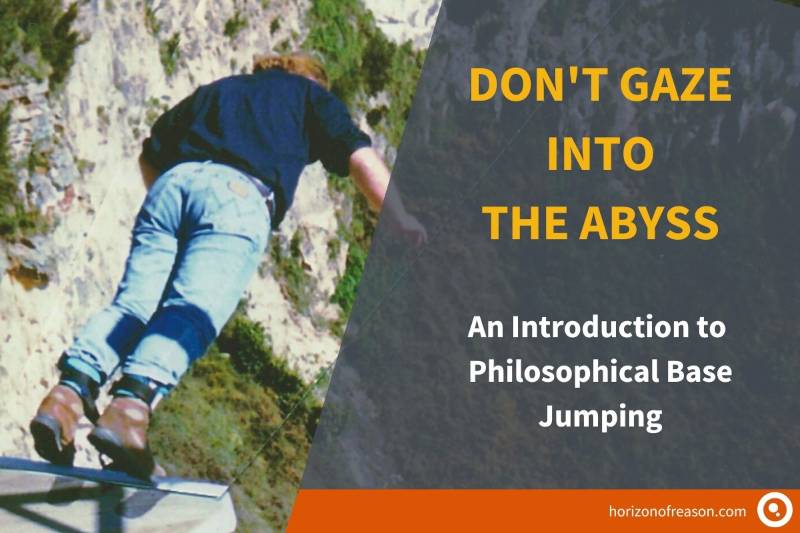
Descartes and his Cogito Ergo Sum: Can we know our selves?

Peter Prevos |
1929 words | 10 minutes
Share this content
Cogito ergo sum, "I think therefore I am", is arguably the most famous and deceivingly simple adage in the history of Western philosophy. The Cogito is important for Descartes’ project in the Meditations because it is the ‘rock and clay’ that he has been seeking as a foundation for his philosophy. There are two rival interpretations of the Cogito: as an immediate inference from the premise ‘I think’ or as an intuition in which the words ‘I think’ are not required as a premise. In this paper, I will analyse these interpretations and argue that the only way the Cogito can be interpreted is as an intuition.
Beyond Unreasonable Doubt
Descartes feels uncomfortable with his self-inflicted doubt about the existence of the world. He feels like he has “fallen into a deep whirlpool”, tumbling him around so that he can “neither stand on the bottom nor swim on the top”.1
He is seeking an Archimedean point, something which he can believe to be true even beyond unreasonable doubt. He finds this foundation of knowledge in the dictum cogito ergo sum. He has expressed this idea in several different ways in his writings; this famous formulation comes from Descartes’ Discourse on Method. At first glance the expression cogito ergo sum appears to be an inference because ergo is the mark of an argument, where sum (I am) follows from cogito (I think). Descartes, however, denied that it is to be interpreted as an inference, but he argues that the sum follows as a direct intuition from cogito. The difference between the two interpretations is that where the Cogito is interpreted as an inference, there is movement from the premise to the conclusion. Whereas when it is interpreted as an intuition, cogito and sum follow immediately from each other, there is no movement of thought.2
Cogito Ergo Sum as an Inference
The traditional formulation of the Cogito—‘I think therefore I am ‘—is structured like an argument with a premise (I think) an operator (therefore) and a conclusion (I am). For it to be a correct syllogism, however, Descartes needs to introduce another premise: “everything that thinks exists”. The structure of this syllogism would be:
- Premise A: I think
- Premise B: Everything that thinks exists
- Conclusion: I exist
There are two possible logical structures for this argument. First, it may be an immediate inference—an inference from a single premise without need for any second general premise such as ‘Everything that thinks exists’; secondly it may be a truncated syllogism needing that further premise. Descartes denies that the Cogito is a truncated syllogism because the second premise is not beyond doubt. The missing premise can only follow from the intuition about his existence. Descartes also argues that the Cogito is immediate, and there is no movement of thought. The Cogito can also not be an inference because as long as Descartes has not refuted the possibility of a deceiving demon controlling our minds, all conclusions from reason are doubtful. What the demon hypothesis, however, can not bring into doubt is that it is me that is being deceived.
The Cogito as an Intuition
The notion of intuition is usually regarded with suspicion, as it can be considered merely labelling the place where a philosophical understanding of the source of our knowledge stops. To determine whether this interpretation is philosophically superior, we need to prove that ‘I think’ and ‘I exist’ are beyond all doubt. Descartes says that there is indeed something special about his belief that he is thinking and his belief that he exists; they are impossible to doubt. Descartes expresses the Cogito in the Second Meditation as an intuition:
… ego sum, ego existo, quoties a me profetur, vel mente concipitur, necessario esse verum. (I am, I exist, every time it is declared by me, or conceived by my mind, it is necessary to be true).
It should be noted that Descartes stresses the first person element in his claim to the certainty of the Cogito. He adds the first person pronoun ego, which is superfluous in Latin as it is already implied by the word cogito. He wants to point out that because it is ‘I’ who is doing the declaring and the conceiving, ‘I’ must also exist. The propositions ‘I think’ and ‘I am’ have the distinctive character of being incorrigible.
An incorrigible proposition satisfies the description: if I believe that P, then P. Incorrigible propositions are usually first-person introspective thoughts like ‘I think’ or ‘I am in pain’. They are not necessarily true, but can not be denied by me, since it is ‘I’ that am doing the thinking or being in pain. The denial of ‘I am thinking’ and ‘I exist’ are not logically false, but pragmatically self-defeating.3
It could be argued that if the existence of the Self is self-evident, then Descartes could omit the intuition ‘I think’. This intuition is however required because at this stage, Descartes is only proving that he is a thinking thing (res cogitans). For as long as Descartes has not refuted the possibility of a Malicious Demon deceiving us about the existence of the world, all material things (res extensans) are doubtable. It is also for this reason that he can not say for example’ ambulo ergo sum’ (I walk therefore I am) because to be able to walk he must after all first be able to prove that the material world exists. The intuitions ‘I think’ and ‘I am’ are thus inseparable.
Conclusion
The interpretation of the Cogito as intuition is philosophically superior because intuition is the faculty by which we gain the initial certainties that make deduction possible in the first place. If the Cogito would be an inference, then it is not the axiom that Descartes is seeking for. The Hindu philosopher Sankara (788–820 AD) expresses the certainty of knowledge of the Self in his commentary on the Vedanta-Sutras eloquently:
Just because it is the Self, we can’t entertain the idea even of its being capable of refutation. For the (knowledge of the) Self is not, in any person’s case, adventitious, not established through the so-called means of right knowledge; it is rather self-established.
Knowledge of the Self can, according to Sankara, not be established by perception or inference because the Self is the agent that acts through these ‘means of right knowledge’. The existence of the Self must therefore be presupposed for Descartes to be able to continue his Meditations and escape from the whirlpool of doubt he has thrown himself in.
Comments by Aubrey Townsend
The Cogito as an inference
You seem to assume that if the Cogito is an inference from a premise to a conclusion, then it must be a syllogism. And of course, Descartes denied that it was a syllogism. There are actually two questions to be untangled here. The first concerns the logical structure of the argument formulated by the phrase ‘I think therefore I am’.
There are two possibilities. First, it may be an immediate inference, that is an inference from a single premise without the need for any second general premise such as ‘Everything that thinks exists’; second it may be a truncated syllogism needing that further premise. Aristotelian logic distinguished immediate from mediate or syllogistic inferences; an immediate inference is involved, for example, when we pass from ‘All men are mortal’ to ‘Some mortals are men’. Some of Descartes’ critics suggested that the Cogito is really a truncated syllogism, and Descartes was keen to deny this for obvious reasons. ‘I think therefore I am’, he claimed, is merely valid; no further premise is required for validity.
He accepts that anyone who argues in this way needs to understand that whatever thinks (or acts in any way) must exist. Still, this logical principle is not a premise in the argument, but rather something that we can learn by attending to the argument and others like it. There is room for debate here, but I think Descartes was right. The second issue concerns not logic but thought: is there a movement of thought expressed in the Cogito, with ‘I think’ coming first and ‘I exist’ being moved to.
Descartes was inclined to say there is no movement of thought, that the conclusion comes to mind immediately on thinking the premise. Notice that this point does not conflict with the claim that there is a kind of logical priority. A further point is worth making here. A syllogism requires two premisses, and immediate inference only needs one premise. There is another possible kind of argument, one which has no premise at all. A reductio ad absurdum (or consequentia mirabilis) is an instance of this sort. Here, instead of starting from a premise which has to be supposed to be known, one starts to form the assumption that the required conclusion is false and then demonstrates that this assumption leads directly to a contradiction, i.e. an impossible result. I think there is some ground for thinking that this pattern better fits the argument as Descartes presents it in Meditation two.
About intuition
You take it that something cannot both be an intuition and an inference, and recognise that Descartes clearly says that the Cogito is an intuition. Certainly, Descartes thought that if the Cogito is an intuition, then there is no movement of thought from premise to conclusion.
But that is compatible with the view that in logic, the Cogito is an immediate inference; indeed, he may have thought that all immediate inferences require an intuition. When Descartes asserts that the cogito is an intuition it is in the context of his denial that there is a syllogism involved, for he would have thought that every syllogistic inference requires a movement of thought, a bringing together of distinct pieces of information from which a new conclusion is derived.
So I think it is not clear that the suggestion that the Cogito is an intuition is an alternative to the traditional immediate inference view. Notice that when Descartes describes the cogito as an intuition, it seems that what he is claiming is that the whole ‘I think therefore I am’ is a simple intuition; it is not made up of parts, ‘I think’ and ‘I exist’ each separately intuited.
And perhaps here is the ground for thinking that there may be another interpretation to look for. The issues get complicated, so I shall not pursue them here. The real issue about the interpretation of the Cogito arises when one attempts to analyse the argument actually presented in Meditation 2; then it becomes hard to reconcile the text with any interpretation suggested by the usual formula ‘I think therefore I am’.
Not only does this not occur in the Meditations, but also the argument presented there does not look to have that structure. That is what suggested to Hintikka that we should look for an alternative interpretation that more closely fits Descartes’ most careful presentation of his argument.
Too many commentators, beginning with the original objectors, just assume that we can work with the formula from the Discourse and not worry about the differences between it and the Meditation argument. Hintikka thought that there were philosophical problems that affect the usual interpretation and that these do not touch the Meditation version.
Notes
René Descartes; John Cottingham, editor, Meditations on first philosophy, (Cambridge: Cambridge University Press, 1996).
Peter Markie, ‘The Cogito and its importance’, in:: John Cottingham, editor, The Cambridge Companion to Descartes, (Cambridge: Cambridge University Press, 1992), p. 144.
Bernard Williams, Descartes: The project of pure enquiry, (London: Penguin Books, 1978).
Share this content


